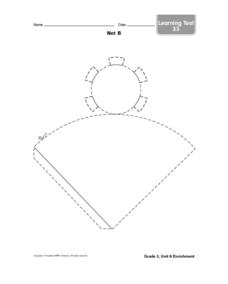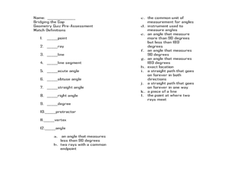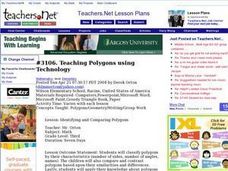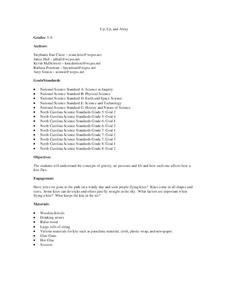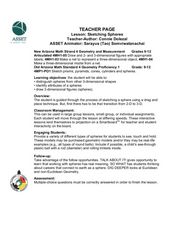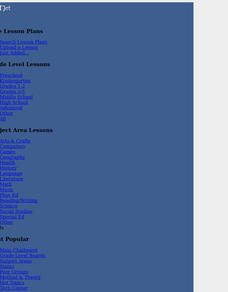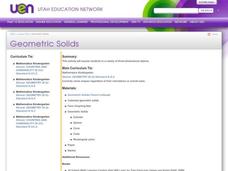Curated OER
Edible Geometry
Students examine a chart that lists the main characteristics of polygons and 3 dimensional figures. They make examples of the polygons and figures using pretzels and gum drops showing how the gum drops are vertices and the pretzels are...
Curated OER
Visualize 3-D Objects and Make Nets of Common Solids
Prisms are the focus of this geometry activity. Students count the number of parts of a prism and chart 26 answers. Vocabulary such as: "faces," "edges," and "verticies" are taught. A well-designed math activity!
Curated OER
Net B- Cone- Learning Tool 33
In this geometry worksheet, students cut out a net of a cone by following along the dotted lines as indicated by the scissors icon. They fold the figure to form a three-dimensional cone which they tape together. There are no directions...
Curated OER
Poly-Mania
This hands-on activity takes young geometers on a tour of 2D polygons and 3D polyhedrons. After exploring different web resources and discussing geometric shapes, small groups construct models of polyhedrons using bendable straws. Note:...
Curated OER
Living in a Geometrical World
Students participate in a series of hand-on, online, and multimedia activities to examine 2 dimensional and 3 dimensional shapes. They describe common geometric solids. They construct rectangular prisms using straws and ribbon.
Curated OER
Countdown Challenge: Platonic Solids - Part I
Use a Platonic solids worksheet to record the number of faces, edges, and vertices of five polyhedra whose faces, edges, and vertices are all identical. For each figure, learners write a proof of Euler's formula (F+V=E+2). They create a...
Curated OER
Geometry Definitions
In this geometry worksheet, students match the geometry term with its definition. Students match 12 geometry terms with their definitions.
Curated OER
Mandalas, Polygons and Symmetry
Students create a geometric pattern using mandalas, polygons and symmetry. In this geometry lesson, students analyze the mathematics involved in making the mandalas, including the shapes and symmetry. Students create their own mandalas...
Curated OER
Geometry Journal: Classifying Solids
In this geometry worksheet, 10th graders respond to journal prompts related to prisms and classifying solid shapes. The two page worksheet contains nine questions. Answers are included.
Curated OER
Pyramids and Prisms: Guler's Formula
Sixth graders detect and categorize the attributes of geometric shapes to solve problems. In this geometry lesson, 6th graders construct a variety of polyhedra. Students recognize the relationships between two dimensional and three...
Curated OER
Introduction to Polyhedra
Students investigate Euler's Formula. In this geometry instructional activity, students perform an inductive activity of Euler's Formula using nets to identify a variety of prism, pyramids, cylinders, and cones.
EngageNY
How Do 3D Printers Work?
If we stack up all the cross sections of a figure, does it create the figure? Pupils make the connection between the complete set of cross sections and the solid. They then view videos in order to see how 3D printers use Cavalerie's...
Shmoop
Coordinate Proofs
How do you know you know? Prove it! The guide goes through several examples and includes a link to a video to teach learners how to work through coordinate proofs. The goal is to prove that different shapes are indeed that shape.
Curated OER
Connecting Formulas Related to Geometric Figures
Students identify diagrams of quadrilaterals and circles by different names and classify the figures. They name the areas for each diagram and practice solving the formulas for each.
Curated OER
Guess My Shape
Learners play a game with shapes. They work in groups to identify the names and characteristics of various shapes. They give each other clues to see if others can identify the shape being described. This is a great hands on activity.
Curated OER
Teaching Polygons using Technology
Third graders utilize different types of computer programs, such as Microsoft paint and Microsoft Word to study and create different types of polygons. They use PowerPoint to create a story about a shape and others that it meets during a...
Curated OER
Up, Up and Away
Tenth graders experiment with gravity and air pressure. In this geometry lesson, 10th graders build their own kits and fly it. They investigate the questions: what keeps a kite in the air and what are some important factors when flying a...
Curated OER
Blast Off with Model Rockets
Students investigate science and math by building a rocket. In this geometry lesson, students build a rocket using paper towel tubes while investigating questions about launching a rocket. They discuss balance and unique structure as...
Curated OER
Geometric Word Problems
In this geometric figures learning exercise, 10th graders solve and complete 11 different word problems. First, they find the area of a regular octagon with a given side. Then, students find the area of each shaded region. They also find...
Curated OER
Hoops: Grade 4 and 5
4th-5th graders will compete in a game similar to Jeopardy in which they answer questions from a variety of subject areas including science, language, and math. The questions are based on an extremely wide variety of topics, so would be...
Curated OER
Sketching Spheres
Students investigate spheres through sketches. In this geometry lesson, students sketch two and three dimensional shapes creating nets. They find and differentiate between the nets for prisms, pyramids, cones, cylinders and spheres.
Curated OER
Cones, Cylinders, Spheres
Students classify polygons by name and shape. In this geometry lesson, students identify the lateral surface of each conic. They differentiate between cones, cylinders and spheres.
Curated OER
Lesson Exchange: Polygons (Middle, Mathematics)
Students discover the relationship between the sides of a polygon and the number of diagonals that can be drawn from one vertex, the number of triangles that those diagonals form, and the sum of the interior angles of that polygon.
Curated OER
Geometric Solids
Students identify and create simple geometric shapes and describe simple spatial relationships. Through discussion, hands-on activities and show and tell, they identify geometric solids in real life and create graphs of commonly found...


